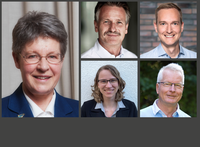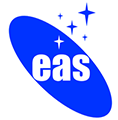German Astronomical Society 2021 Awards
Jocelyn Bell Burnell is honoured with the Schwarzschild Medal; Fabian Schneider receives the Ludwig Biermann Award, Martin Roth the Instrument Development Award, Anke Arentsen the Doctoral Thesis Award and Uwe Reichert the Bürgel Prize. Lukas Weghs is awarded the Jugend forscht special prize.
Professor Dame Jocelyn Bell Burnell, currently visiting Professor of Astrophysics at the University of Oxford, receives the Karl Schwarzschild Medal of the German Astronomical Society 2021 for her outstanding contributions to the field of astrophysics. With the highest award for astronomical research in Germany, the Astronomical Society honours Professor Bell Burnell as an eminent scientist whose work has not only created the field of pulsar astronomy - with diverse applications in a wide range of fundamental physics and astrophysics - but has had a great impact on the field of astrophysics as a whole. Many prestigious institutions and organisations, such as the Institute of Physics and the Royal Astronomical Society, have benefited greatly from her scientific leadership. With persistence and insight, driven by curiosity and determination, her discoveries, her research and her life-long dedication to conducting and promoting astronomical research, she has been one of the most inspiring scientists for generations.
Professor Martin Roth from the Leibniz Institute for Astrophysics Potsdam (AIP) is being honoured with the Instrument Development Award for his significant work on the development of 3D spectroscopy, his outstanding contributions to the research and development of astrophotonics, to the teaching and training of young scientists in astronomical instrumentation, and to the resulting advances in the astrophysical study of resolved stellar populations. Under his leadership, the PMAS instrument was a breakthrough in the observational technique of integral field spectroscopy, crowned by the successes of MUSE and VIRUS, producing internationally visible science results. He also been a pioneer in multi-disciplinary research, and transfer of knowledge and technology, e.g., the use of astronomical instrumentation for medicine and life science. His achievements include the establishment of the interdisciplinary centre innoFSPEC, which is dedicated to the development of astrophotonic technologies and is unique in Germany.
With the Ludwig-Biermann-Award, the AG honours Fabian Schneider, junior group leader at the Heidelberg Institute for Theoretical Studies (HITS), for his work on the study of the evolution of massive stars, binary stars and supernovae. His research achievements led to numerous and highly cited publications. He is considered an internationally recognized expert in his field. Fabian Schneider received his PhD at the University of Bonn in 2015. He then moved to Oxford University as a Hintze Fellow. In 2018 he became a Gliese Fellow at the Center for Astronomy at Heidelberg University. In 2020, he received an ERC Starting Grant, and started to establish a research group focused on stellar evolution theory and the turbulent and explosive lives of massive stars at HITS in January 2021.
For her spectacular results on the chemical composition and dynamics of stars in the inner regions of our Milky Way, the AG awards the Doctoral Thesis Prize to Anke Arentsen. She received her PhD from the Leibniz Institute for Astrophysics Potsdam (AIP) and is currently a postdoc at the astronomical observatory in Strasbourg. Her PhD thesis was dedicated to Galactic Archeology and the oldest stars in our home galaxy. Anke Arentsen made important contributions to the understanding of the Milky Way and what it looked like at its infancy. She published the scientific results of her dissertation in several publications and successfully presented them at international conferences and public lectures.
The AG awards the Bruno H. Bürgel Prize to Uwe Reichert, for excellent popular representations of the latest astronomy results in the German media. As editor-in-chief of the astronomy magazine Sterne und Weltraum, Uwe Reichert played a leading role in determining the development and content of the magazine for over 13 years, and was extremely adept at adapting the editorial and technical practices to the new challenges of the digital media world. Sterne und Weltraum is the leading German language publication for generally accessible astronomy. It is a globally unique cooperation between active professional astronomers, the amateur astronomy community, and science journalists. It is characterised by outstanding quality, educational materials, an internet platform with daily astronomy news, and a very successful Twitter and Youtube channel.
Lukas Weghs, from the Städtisches Gymnasium Kempen, receives a special price from the AG for the best work in the field of astronomy in the national competition "Jugend forscht" (youth's research). With his work "Photometric search for Exomoons by using deep learning and a convolutional neuronal network", which he developed at the Institute of Planetary Research at DLR in Berlin, he was also the national winner in the field of space and earth sciences. Lukas developed a self-learning program for a high-performance computer that supports the search for moons around exoplanets. The program systematically analyses deviations in the light curve of transit events that cannot be explained by the transiting planet alone. It thus provides clues to the possible existence of exomoons.
The award ceremonies will take place during the virtual annual meeting of the German Astronomical Society from September 13-17, 2021.
Photos and Credits:
Jocelyn Bell Burnell: Courtesy Royal Society of Edinburgh
Martin Roth: BMBF
Fabian Schneider: Annette Mück / HITS
Anke Arentsen: private
Uwe Reichert: private




